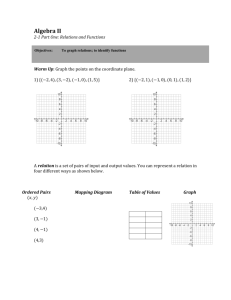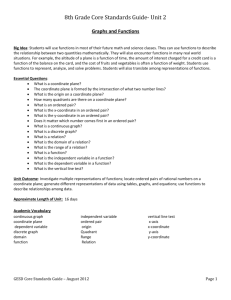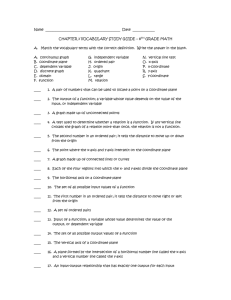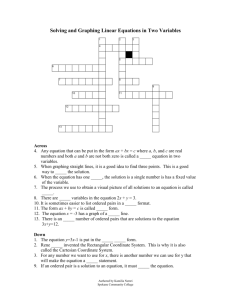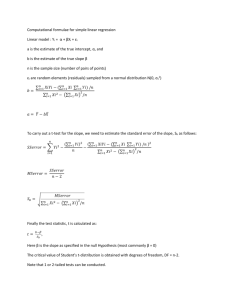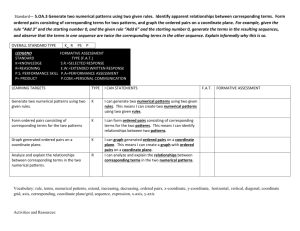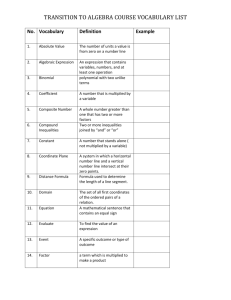Coordinate Plane Graphing: Ordered Pairs and Slopes of Lines
advertisement
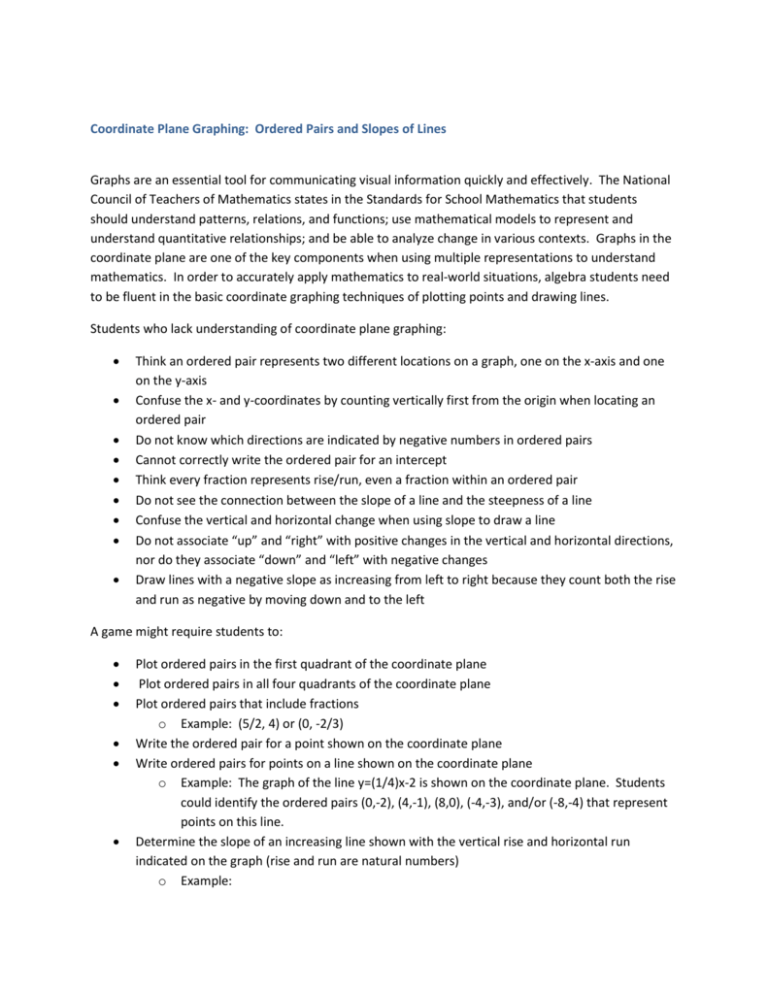
Coordinate Plane Graphing: Ordered Pairs and Slopes of Lines Graphs are an essential tool for communicating visual information quickly and effectively. The National Council of Teachers of Mathematics states in the Standards for School Mathematics that students should understand patterns, relations, and functions; use mathematical models to represent and understand quantitative relationships; and be able to analyze change in various contexts. Graphs in the coordinate plane are one of the key components when using multiple representations to understand mathematics. In order to accurately apply mathematics to real-world situations, algebra students need to be fluent in the basic coordinate graphing techniques of plotting points and drawing lines. Students who lack understanding of coordinate plane graphing: Think an ordered pair represents two different locations on a graph, one on the x-axis and one on the y-axis Confuse the x- and y-coordinates by counting vertically first from the origin when locating an ordered pair Do not know which directions are indicated by negative numbers in ordered pairs Cannot correctly write the ordered pair for an intercept Think every fraction represents rise/run, even a fraction within an ordered pair Do not see the connection between the slope of a line and the steepness of a line Confuse the vertical and horizontal change when using slope to draw a line Do not associate “up” and “right” with positive changes in the vertical and horizontal directions, nor do they associate “down” and “left” with negative changes Draw lines with a negative slope as increasing from left to right because they count both the rise and run as negative by moving down and to the left A game might require students to: Plot ordered pairs in the first quadrant of the coordinate plane Plot ordered pairs in all four quadrants of the coordinate plane Plot ordered pairs that include fractions o Example: (5/2, 4) or (0, -2/3) Write the ordered pair for a point shown on the coordinate plane Write ordered pairs for points on a line shown on the coordinate plane o Example: The graph of the line y=(1/4)x-2 is shown on the coordinate plane. Students could identify the ordered pairs (0,-2), (4,-1), (8,0), (-4,-3), and/or (-8,-4) that represent points on this line. Determine the slope of an increasing line shown with the vertical rise and horizontal run indicated on the graph (rise and run are natural numbers) o Example: OR Determine the slope of an increasing or decreasing line shown with the vertical rise and horizontal run indicated on the graph (rise and run are integers) Determine the slope of a line shown on a coordinate plane (y-intercept and rise and run are integers) Graph a line with a given positive slope; one point on the line is already shown on the graph, so students would indicate the location of a second point that the line passes through o Example: Graph the line with slope 3/5 that passes through (-2,-1). The point (-2,-1) would already be shown on the graph. Students would indicate that the line should pass through the point (3,2) or (8,5) or (-7,-4) by clicking on one of these locations on the graph. Graph a line with a given negative slope; one point on the line is already shown on the graph, so students would indicate the location of a second point that the line passes through Graph a line with a given positive or negative slope; one point on the line is already shown on the graph, so students would indicate the location of a second point that the line passes through Graph a line with a given starting point and a given slope o Example: Graph the line with slope -2 that passes through the point (-6,4). Students would indicate the location of the given ordered pair (-6,4) as a starting point. Then students would indicate that the line should also pass through the point (-5,2) or (-4,0) or (-3,-2) or (-7,6), etc by clicking on one of these locations on the graph. Test Questions MATH 0803 1. An interior decorator has asked a small linens company to make the bedspreads that she will use on the beds in a hotel she is decorating. The linens company has already completed 14 bedspreads. The company can produce 3 bedspreads each day. Use the graph to answer the questions. The graph shows the number of completed bedspreads as a function of time, in days from now. 1a) Use the graph to estimate how many bedspreads will be completed 50 days from now. 1b) Use the graph to estimate when 89 bedspreads were completed. 1c) The interior decorator will need a total of 180 bedspreads for all the beds in the hotel. Use the graph to estimate how long it will take the company to complete all the needed bedspreads. 1d) Use the graph to estimate when the linens company started making the bedspread order if they produced bedspreads before now at the same rate. MATH 0804 9. Given the equation 4 x 7 y 56 , choose one of the following methods of graphing and graph the equation on your answer sheet. a. Two intercepts b. Two points c. Slope-intercept 10. The graph below represents the increase in interest as the principal increases by $1.00. Find the slope of this line and interpret its meaning. 11. Rebecca is a marathon runner. She runs the first part of a marathon in 30 minutes. Then, she runs at a pace of 8 miles per hour, which means her average rate is 7.5 minutes per mile. In the equation, y 7.5 x 30 , y represents her total time and x represents the number of miles after running the first part of the race. Below is the graph of the equation. 12a) State the y-intercept as an ordered pair and interpret its meaning in context to this problem. 12b) State one other point on the graph and interpret its meaning in context to this problem. MATH 0805 1. Cheryl makes clay vases. She bought a used potter’s wheel for $75.00 online. It cost her $5.00 to make each vase. She can sell the vases for $20.00 each. The graph below shows the graph of her cost and income equations. Use the graph to approximate the point where her cost and income are equal. Use a complete sentence to explain what this point means in the context of the problem situation.
